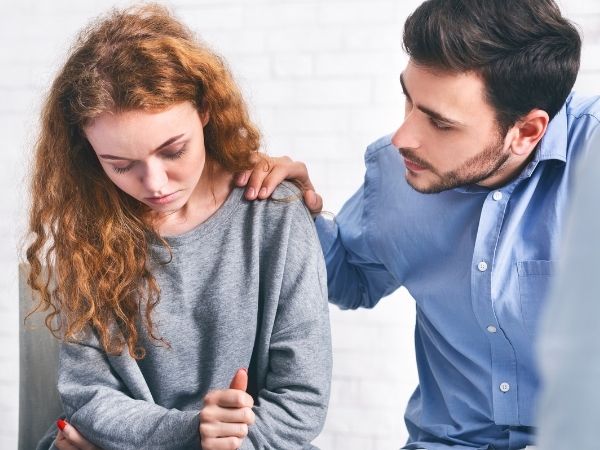Relapsing during addiction treatment is indeed a challenging time– not only for the recovering person with addiction but their loved ones, as well. If you know someone who might be suffering from any addiction, you’ll have to keep your thoughts and emotions in check, so you don’t push your loved one further away. You might be wondering what to say to someone who relapsed.
In addition to treatment for chronic drug relapse, you– a part of their support circle– will play a critical role in their recovery.
If you’re in a situation where someone you care about has relapsed, here’s what to say to them.
Signs Of A Drug Addiction Relapse
The saying, “Hope for the best but prepare for the worst,” fits very well with the topic of relapse. Even though you are hopeful that your loved one will have a successful recovery, there will always be a chance of them relapsing.
With that said, you should be aware of the signs and symptoms of relapse so you can help them.
Decline in self-care or Change in appearance
The substance quickly becomes a priority when someone relapses. This can take a toll on their behavior– missing meals, skipping showers.
Depression, Anxiety, and Mood Changes
Mental health disorders and addiction often go hand in hand. On the one hand, discomfort or low moods can trigger a relapse. On the other, people with anxiety or depression have a higher risk of relapsing.

Whatever the case, if you notice that your loved one seems depressed or anxious, make sure to check on them.
Hanging out with people associated with their addiction
Another trigger of relapse is things, places, or people associated with substance use. When someone starts to spend time with them again, they are likely using again.
Isolation
They might have stopped attending recovery-related meetings, declined invites to hang out multiple times, or canceled therapy sessions. Check on them if you notice this pattern.
Frequently asking for money
When they constantly ask you for money, this could be a major sign that they are using again. They will do anything to satiate their cravings, and asking you for money is a gateway to that. They might even resort to stealing if they can’t get anything from you or other people.
7 Things To Say To Someone Who Relapsed From Drug Addiction
1. “Do you want to talk about it?”
You might think that forcing them to see the situation is helpful. But on the contrary, this can trigger plenty of intense feelings– and they are overwhelmed as it is.
You have to make sure that they are ready to open up. If not, don’t push it but let them know that you’re there when they are prepared to talk, and you will ask again.
2. “You are not alone.” and “I’m still here for you.”
Learning what to say to someone who relapsed these are among the most important ones.
On the part of the recovering addict, one of the worst feelings, when they relapse, is thinking they’ve let their loved ones down– and that’s on top of “failing” themselves.

It might be difficult for them to face you after a relapse. So, let them know and feel that you are still there for them, ready and willing to support and help. Don’t just say that you won’t give up on them but show them that you’re committed to their recovery.
3. “What can I do to help?”
When your friend or family member relapses, you might feel inclined to offer advice. However, they understand their situation better than anyone. So, it’s better to ask them what they need.
Asking them instead of telling them what to do gives them a sense of control over their recovery, which leads to feeling empowered.
4. “Relapsing doesn’t mean you failed.”
No, a relapse does not equate to failure. In fact, drug addiction relapse statistics show that it’s relatively common. According to a study in The Journal of the American Medical Association (JAMA), 40% to 60% of people who have been treated for alcoholism or addiction relapse within a year.
Although relapses can happen anytime and chronic relapse drug addiction statistics are different, chances decrease the longer the recovering addict stays sober.
Despite these, people who have relapsed still feel defeated and like a failure. As part of their support system, it’s your duty to make them understand that they did not fail, that they just hit a bump on the road. You just have to help them back up.
5. “Did you learn anything from this?”
One way to make them see they did not fail, shape their situation as a learning experience. By recounting their situation, they can look back at what happened, identify their triggers, and understand what and what not to do from then on.
Just remember to ask it in a non-judgmental way and communicate it in a way that you genuinely want to hear their story.
6. “You became sober before and you can do it again.”
One of the most critical things to have when helping a friend or family member who relapsed is optimism. They are probably disheartened and stressed and making them not feel that is critical.
Remind them of their progress and that they can do it again. Now that they know what happens, it can be easier for them to push through.
7. “Let’s get you back on track.”
The word here is “let’s.” It’s a massive indicator that you are also a part of their recovery journey, reminding them they are not alone through it.

If you know someone who’s a recovering person from addiction, there is a chance of relapse. There always will be. If they do, they’ll need you then more than ever. Be there to support them with kind and loving words. Offer them a helping hand and get them back on track.
Choosing the right treatment center for addiction? Then, turn to Buena Vista Health and Recovery Centers. You can contact us at (800) 922-0095, or go to any of our locations:
CAVE CREEK
29858 N. Tatum Blvd.
Cave Creek, AZ 85331
CHANDLER
3033 South Arizona Avenue
Chandler, Arizona 85248
TUCSON
5151 East Pima Road
Tucson, Arizona 85712
SCOTTSDALE
8171 E Indian Bend Rd
Scottsdale, AZ 85250





